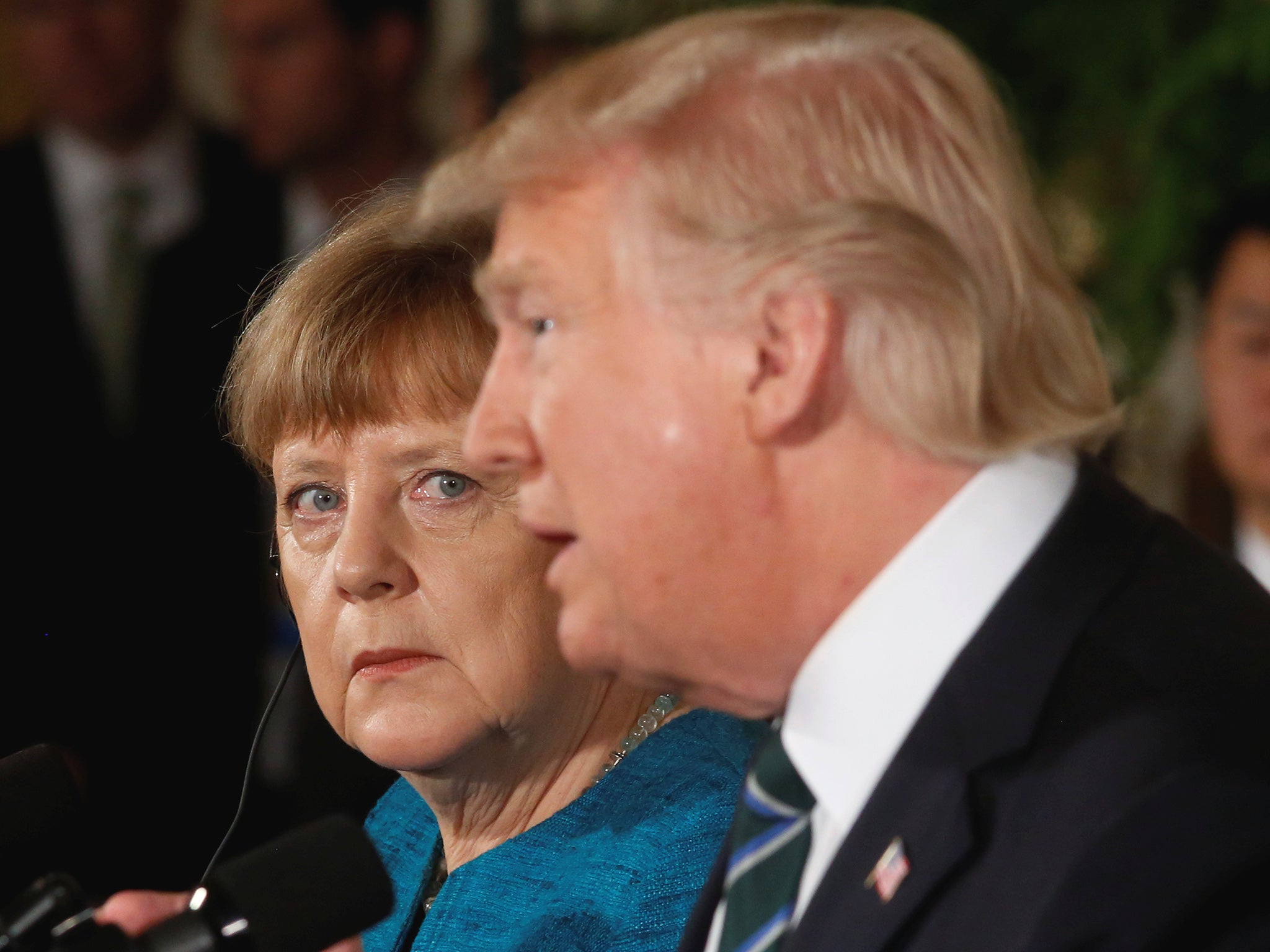Trump claims he is 'not an isolationist' during German Chancellor Merkel's US visit
German Chancellor and US President discuss trade agreements, Nato, and job training programmes

Donald Trump claimed not to be an “isolationist” during an at-times awkward press conference for Angela Merkel’s first visit to the US since he took office.
The comment came in response to a German reporter’s question about Mr Trump’s anti-immigration policies and stance on trade agreements during a round of statements and questioning that ranged from NATO to Mr Trump’s wiretapping claims.
The leaders, who could not be more different in demeanour, first met with business leaders from the US and Germany to discuss modelling a US vocational training programme on Germany’s apprenticeship scheme as an alternative to university education.
The meeting comes a day after Mr Trump’s proposed budget cuts to federal student grants, loans, and public education funding.
During her statement Ms Merkel quipped “it’s much better to talk to one another, not talk about one another”, referring perhaps to Mr Trump’s statements about Ms Merkel last year when he said “she blew it ... She ought to be ashamed of herself” on her handling of Germany’s migrant crisis.
Of the topics discussed, trade was at the forefront. Mr Trump claimed millions of Americans are “left behind” by “unfair” trade agreements and said his stance on trade is “probably why I’m here today [as president]”.
“Negotiators for Germany have done far better than negotiators for the US", Mr Trump said, adding that North American Free Trade Agreement is “horrible”.
Mr Trump claimed “we don’t want victory, we want fairness”.
He also added that he is “a free trader, but also a fair trader”. The concept of “fair trade” is more widely thought of as the movement to give exporters in developing countries better prices for their goods and promote improvement of social and environmental conditions for those exporters.

Ms Merkel echoed that statement and said she hopes the EU and US can resume the bilateral trade agreement they had, noting that many more people in Germany had opposed to free trade than in the US.
On Nato, a military alliance of several countries, Mr Trump said he was encouraged to see Germany commit to spending two per cent of their GDP to contribute to the organisation.
“Many countries owe vast sums and it is unfair” to the US, Mr Trump said.
Bastian Hermisson, executive director of Washington DC-based Heinrich-Boell Foundation, which works on the US-German relationship, told The Independent Ms Merkel put Germany on the path to reach two per cent by 2024 in part because it had “become more pressing since the US election” to do so.
It was “not just because of increased pressure from the US, but also because of an increased awareness throughout the EU that they might not be able to rely on US security guarantees in the future anymore,” Mr Hermisson said.
He and other experts have told The Independent that the Trump administration seems not to understand, or at least undervalues, the money Germany and the EU are spending on diplomacy, aid, and development efforts around the world in order to reduce conflict.
Mr Trump emphasised in his comments that the US military was “depleted” by the Obama administration – something he seeks to fix with a $54bn increase in funding – but it is “a very strong country”.
Climate change may be an area where the two leaders differ the most.
Mr Trump just announced he proposes to cut $100m across several agencies to climate change programme funding.
Germany, on the other hand, has some of the lowest carbon emissions rates in the EU and has been a champion of supporting renewable energy work around the world.
Under the Obama administration, the US was contributing to multi-national funds set up to help poorer countries adapt their infrastructure to worsening climate change.
Mr Hermisson said he does not “foresee a transatlantic compromise on that topic which seems to be an ideological one for the new US administration, and not one based on science”.
He noted that Germany and the EU will continue their contributions to the funds.
“In the US, it will most likely depend on market forces, where i.e. renewables are competitive, and new coal plants are not, as well as on the continued climate related initiatives of cities and states,” Mr Hermisson explained.
The final topic that was discussed was Mr Trump’s wild accusations that former President Obama had wiretapped Trump Tower during the 2016 election.
He referenced Ms Merkel also being surveilled during the Obama administration and seemed to confirm he thought he was indeed wiretapped, saying “at least we have something in common”.
He claimed “we said nothing, all we did was quote a very talented legal mind on Fox – you should be talking to Fox”.
Former judge Andrew Napolitano said in an interview on the television channel that he believed that GCHQ wiretapped Mr Trump on behalf of the Obama administration.
White House Press Secretary Sean Spicer has apologised to the UK for the accusation, for which there does not appear to be any evidence, but no apology was made by Mr Trump.
Join our commenting forum
Join thought-provoking conversations, follow other Independent readers and see their replies
Comments
Bookmark popover
Removed from bookmarks